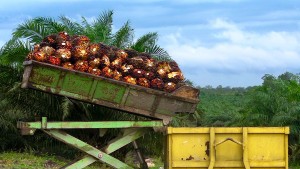
Whether you’re one of the 3,200 companies that do business in California with at least $100 million in worldwide gross receipts, or a consumer that buys products from anywhere other than your local mom and pop shops, you better check this out. Effective this month, a new law called the Transparency in Supply Chains Act requires retailers and manufacturers to publicly disclose their efforts to eradicate slavery and human trafficking from their supply chains.
This new law comes at a critical time when one of the largest importers of palm oil into the U.S. and trader of 25% of the world’s palm oil — Cargill, Inc. — still refuses to adopt supply chain safeguards. Without proper safeguards in place, Cargill continues to purchase, trade and profit from palm oil grown on lands stolen from local communities and other palm plantation areas with active, ongoing social conflict and human rights violations, including slave labor. Indeed, the U.S. Department of Labor has placed Indonesian and Malaysian palm oil on its “Red List” of products produced by child and forced labor. Cargill has repeatedly been made aware of these problems, but has yet to acknowledge the abuses or take action to resolve them.
Here’s the joint press statement we released with As You Sow’s Responsible Sourcing Network and Green America:
Advocacy groups say slave labor connected to palm oil, chocolate and cotton production will provide initial test cases for compliance with the new Transparency in Supply Chains Act
San Francisco, CA – Leading environmental and corporate social responsibility organizations say that chronic human rights abuses associated with popular products like chocolate and cotton tee shirts will join controversial food additive palm oil to provide initial test cases for companies striving to comply with California’s Supply Chain Transparency Act (SB 657). The new law that went into effect Jan 1st, 2012, requires retailers and manufacturers to publicly disclose their efforts to eradicate slavery and human trafficking from their supply chains. The law applies to all corporations doing business in California with more than $100 million in worldwide gross receipts – an estimated 3,200 companies.
A roundtable focused on the new California law was held at the Bay Area Council in San Francisco on January 6th and was attended by advocacy organizations, attorneys, state representatives and executives from several Bay Area corporations, including Hewlett-Packard, McKesson, PG&E, Levi Strauss, Gap Inc. and Safeway. Following the roundtable, representatives of Rainforest Action Network, Responsible Sourcing Network and Green America issued the following statements.
Rainforest Action Network’s (RAN’s) Forest Program Director Lindsey Allen commented:
“California’s new law is designed to give consumers the information they need to make more informed choices about what products they buy. In addition to the widespread destruction of rainforests that result from palm oil production, it has been clear for many years that slave labor, debt bondage and human rights abuses on plantations in Indonesia and Malaysia are part of what has made palm oil into the cheap and ubiquitous food additive it is today. In 2010, the US Dept. of Labor confirmed this by placing palm oil from Malaysia and Indonesia on its List of Goods Produced by Child Labor or Forced Labor.
It is past time that companies like agribusiness giant Cargill Inc. acknowledge the true costs of palm oil and this law’s transparency requirements are a first step. The law’s mandate that companies report what they are or are not doing to address slave labor in their supply chains will help to publicly distinguish corporate leaders from laggards when it comes to aligning products with the values consumers care most about.”
Green America’s Fair Trade Campaigns Director, Elizabeth O’Connell said:
“For more than ten years, consumers have called on chocolate companies to take more responsibility for their supply chains and ensure that forced, trafficked, and child labor were not used to harvest their cocoa beans. While some companies have taken voluntary steps to prevent labor abuses, such as third party certification, other major companies, including Hershey, continue to drag their feet. The passage of California’s SB657 will require that all companies disclose what they are doing to prevent labor abuse in their supply chains, and therefore, pressure laggards like Hershey to finally address these issues.
Responsible Sourcing Network (RSN) Director Patricia Jurewicz said,
“Investors are looking for more than just the transparency this statute requires. Even more important to investors will be seeing the new steps companies are taking to minimize reputational risks and be proactive in eliminating slavery from the products they sell. For example, we are tracking for the investment community if companies have signed our pledge and are participating in our initiative to stop forced child labor in the cotton fields of Uzbekistan.”
For more information:
The US Dept. of Labor 2011 List of Goods Produced by Child Labor or Forced Labor
http://www.dol.gov/ilab/programs/ocft/PDF/2011TVPRA.pdf
Effective Supply Chain Accountability: Investor Guidance on Implementation of The California Transparency in Supply Chains Act and Beyond
http://www.iccr.org/issues/subpages/pdf/11.17.11SupplyChainGuide.pdf
Compliance is Not Enough: Best Practices in Responding to The California Transparency in Supply Chains Act
http://www.verite.org/sites/default/files/VTE_WhitePaper_California_Bill657FINAL5.pdf
###
Rainforest Action Network runs hard-hitting campaigns to break North America’s fossil fuels addiction, protect endangered forests and Indigenous rights, and stop destructive investments around the world through education, grassroots organizing, and non-violent direct action. For more information, please visit: www.ran.org.
Green America is the nation’s leading green economy organization. Founded in 1982, Green America (formerly Co-op America) provides the economic strategies, organizing power and practical tools for businesses and individuals to solve today’s social and environmental problems. For more information, go to: http://www.GreenAmerica.org.
Responsible Sourcing Network is a project of the non-profit organization As You Sow. RSN addresses human rights violations and environmental destruction in the supply chains of consumer products at the raw commodity level. For more information, please visit www.sourcingnetwork.org.